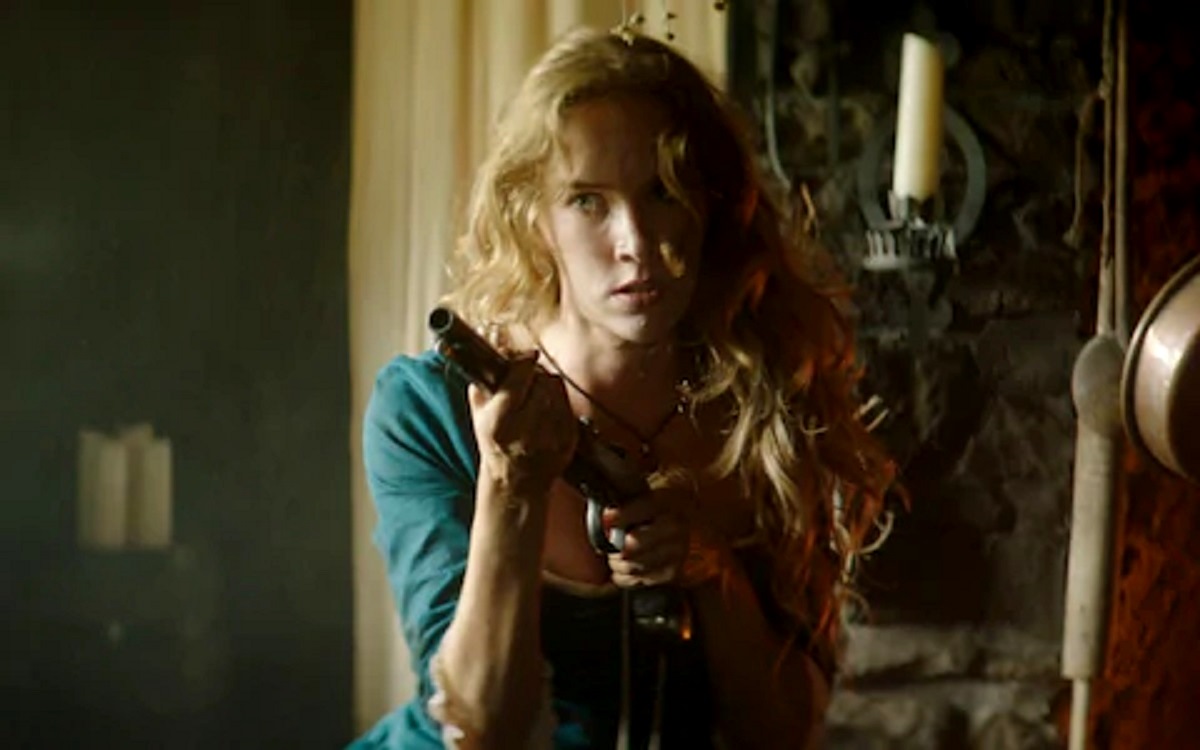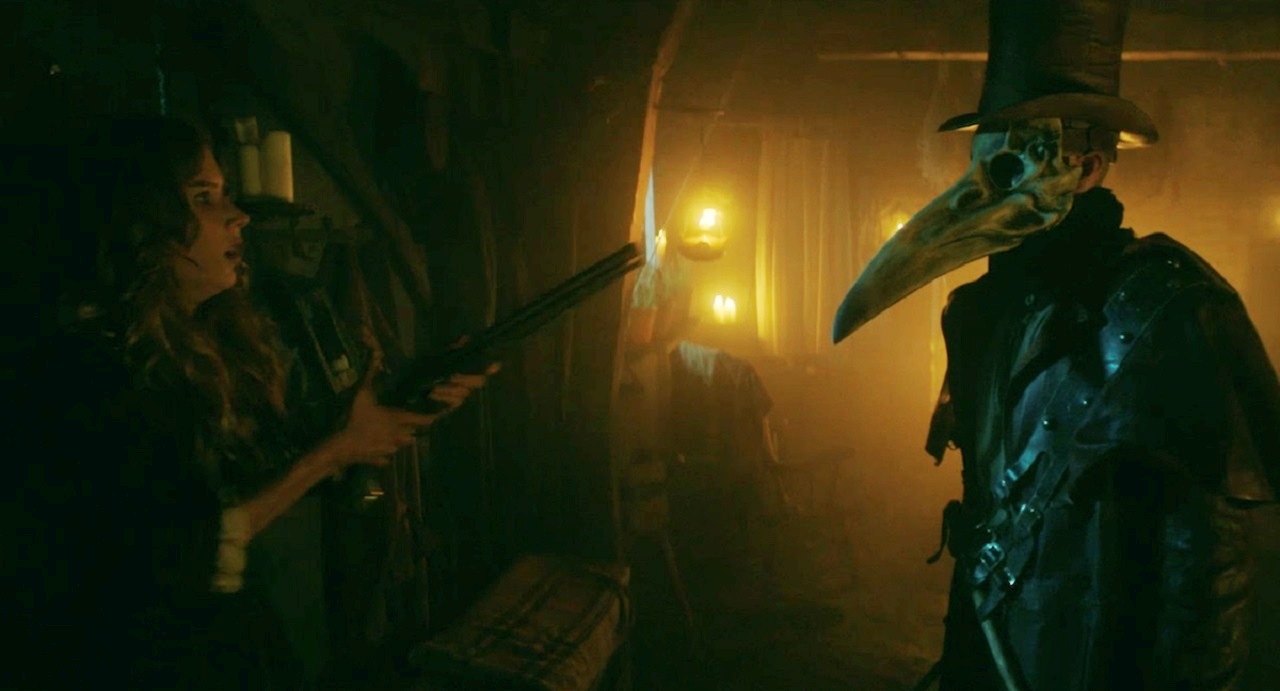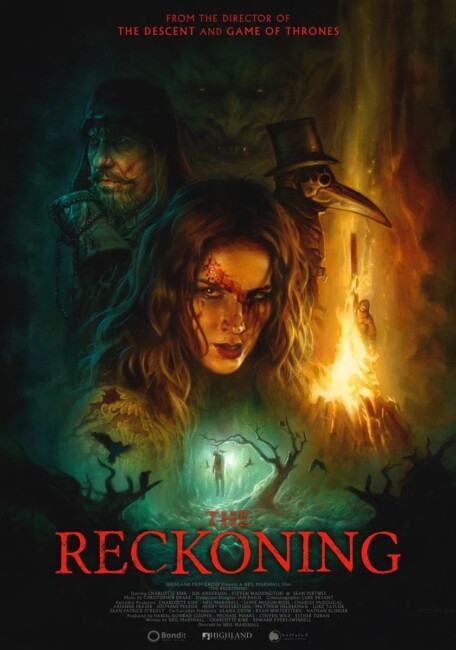UK. 2020.
Crew
Director – Neil Marshall, Screenplay – Edward Evers-Swindell, Charlotte Kirk & Neil Marshall, Based on the Story Red Hex by Edward Evers-Swindell & Antony Jones, Producers – Daniel-Konrad Cooper, Michael Marks, Esther Turan & Steffen Wild, Photography – Luke Bryant, Music – Christopher Drake, Visual Effects Supervisor – Thomas Moser, Visual Effects – Filmgate AB, Special Effects Supervisor – Adam Szlavy, Makeup Effects – Jack Coakley, Prosthetics Supervisor/Devil Design – Conal Palmer, Production Design – Ian Bailie. Production Company – Fourth Culture Films/Bondit Media Capital.
Cast
Charlotte Kirk (Grace Haverstock), Sean Pertwee (John Moorcroft), Steve Waddington (Squire Pendleton), Joe Anderson (Joseph Haverstock), Callum Golden (Edwin Oswald), Sarah Lambie (Kate Tobias), Leon Ockenden (Morton Tobias), Suzanne MacGowan (Ursula), Ian Whyte (Lucifer), Indianna Ryan (Astrid)
Plot
The year 1665. Grace Haverstock’s husband Joseph returns home infected with the plague. Rather than infect her and their infant daughter, Joseph hangs himself in the field. Grace buries the body but then faces Squire Pendleton demanding that month’s rent. When he suggests that she pay by giving herself to him, Grace is forced to physically fight him off. In the local bar, Pendleton accuses Grace of being a witch. A local mob comes and burns the house. Grace is imprisoned where the witchfinder John Moorcroft tortures her to get her to confess.
From the 2000s onwards, the British Neil Marshall seemed like a highly promising director on the rise who could easily have become a major new genre name. Marshall first appeared with the werewolf film Dog Soldiers (2002) and then gained considerable acclaim with the caving horror film The Descent (2005). This was followed by the quite good likes of the post-holocaust film Doomsday (2008) and the non-genre historical film Centurion (2010). However, the 2010s were marked by Marshall’s disappearance off the radar into directing only tv episodes and the Bad Seed episode of the anthology Tales of Halloween (2015). That was before his return with the reboot of Hellboy (2019), which proved a miserable failure with rumours of set in-fighting between Marshall, the producers and lead actor. The Reckoning seems to have been an opportunity for Marshall to have redeemed himself.
Before watching The Reckoning, it is worth doing some reading on the principals – Neil Marshall and his lead actress, co-writer and girlfriend Charlotte Kirk. There is an eye-opening Vanity Fair article Sex and Texts, Secrets and Lies: How the Charlotte Kirk Saga Blew Up Hollywood on how Kirk came to Hollywood from the UK and seemed willing to trade sex for acting opportunities, which proceeded to blow up into a major scandal. Quite whether Kirk was another victim of the #MeToo era taken advantage of by studio executives or whether she (and Marshall who was implicated) engaged in a blackmail scheme to shakedown studio heads is something the article does not reach a firm conclusion about. However, the upshot was that due to their dalliance with Kirk, several high-profile studio executives forced to resign following leaked sexts and evidence of payoffs. Certainly, this does give a whole other reading to the story of The Reckoning (which Kirk co-wrote) where she plays a woman who is sexually pressured by a more powerful man who then falsely accuses her and has her tortured before she rises up and burns the whole system down.
Plotwise, The Reckoning is a throwback to a spate of films we had around the early 1970s beginning with Matthew Hopkins – Witchfinder General (1968), a horror film centred around the real-life figure of the historical witchfinder. This was followed by other films like Mark of the Devil (1970), Blood on Satan’s Claw (1971), The Demons (1972), Inquisition (1976) and most famously Ken Russell’s The Devils (1971) that placed an emphasis on sadism and torture of the witches. (For a more detailed listing see Films About Witch Persecutions).

What kills The Reckoning is that it establishes zero historical believability. Charlotte Kirk plays a 17th Century peasant’s wife but only looks like a modern actress outfitted in something vaguely resembling period costume. Rather than a peasant woman of the era who would be expected to wear a drab long skirt and a bonnet as head covering, Kirk comes in a colourful silk dress with plunging décolletage (that would probably have cost more than a peasant’s entire farm), her head uncovered and face made up like a modern fashion model.
The film also cites figures about witch persecutions that are wildly exaggerated, claiming that there were half a million persecutions in the UK and US. The real number of deaths worldwide is only estimated by historians as between 40,000-60,000. To place this in contrast, the total population of England in the 1600s was 5.5 million and the population of the US (not counting Native Americans) was 75,000 so that number of witches the film claims were killed amounts to a tenth of the entire population of both countries.
Neil Marshall seems to be making zero effort. Much of the show consists of lame dream jumps and appearances of the dead husband and even The Devil himself. When you consider these weak attempts to spike an audience with quick-and-now jumps against the masterful suspense Marshall demonstrated in The Descent, the fall in quality of his work is even more apparent. What I found most laughable was the appropriation of plague doctor masks for the witch persecutors – clearly, Marshall was aiming for something like figures in KKK masks where the modern equivalent would be like trying to imagine a doctor wearing a surgical mask and gown or a virologist in a vac suit as a sinister figure.

The Reckoning is a film that wants to be about the historical witch trials but it has absolutely nothing to say about them. It does nothing to discuss the historical period that led to the witch hunts, the ideological beliefs that led to people being persecuted as witches, the sense of fear and superstition – the one film of recent that does capture that in abundance was The Witch: A New-England Folktale (2015). All that Marshall gives us is easy cliches of an innocent women wrongly persecuted; a corrupt male who persecutes her to have his own ends; followed by a woman on the vengeance trail wielding a sword.
In fact, the only drive the film has is a feminist one that rewrites history to make a story about female empowerment. The story focuses on one persecuted woman but writes her as a modern woman engaging in a fantasy of empowerment and in effect burning down the corrupt patriarchy that condemned her. Even the supporting character of Sarah Lambie’s Kate takes a stand against a husband who sides with the persecuting men and then simply kills him by allowing a horse to ride off and crush his head with the cartwheel.
Neil Marshall and Charlotte Kirk subsequently went on to collaborate on the monster movie The Lair (2022) and the action film Duchess (2024).
Trailer here


